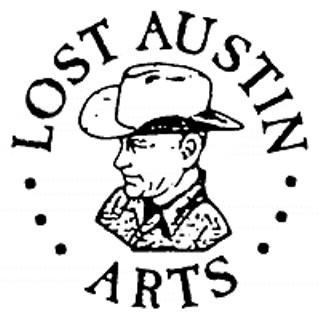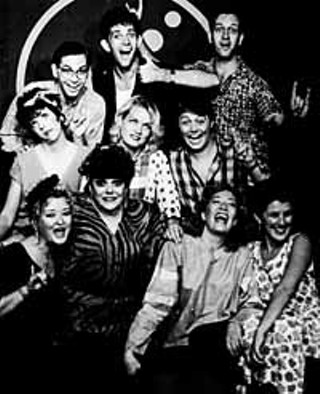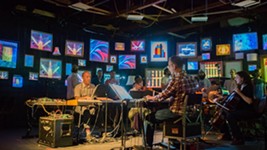Livin' Lavaca Loca
Laughing It Up at the Comedy Workshop
By Angela Davis, Fri., Jan. 26, 2001

Remember when Jay Leno used to be funny? Back during the early Eighties? David Letterman had recently found a home in late night on NBC, and Leno was a frequent guest. He was cutting and quick and displayed a savage wit that has since given way, in public at least, to a facility for fawning and a penchant for lame skits. But in those days, it was a treat to watch Jay and Dave, now competitors, then friends, crack each other up. I wanted to hang out with those guys, people who would make me laugh all the time.
Leno traveled tirelessly during the late Seventies and throughout the Eighties, during the so-called comedy boom. He was a true road warrior, playing every club in every town that had a club. Austin had a club then, and it was called the Comedy Workshop. I'd never been there. I was in the midst of my previous life: majoring in Radio-Television-Film, dropping out, working -- lather, rinse, repeat. When I heard that Leno would be appearing at the Workshop for a week (February, 1983), I crawled out of my shell and made a reservation.
Located on 15th Street near Lavaca, the original Workshop was a small, dark affair. Because in its previous incarnation it had been a male strip club, the walls were covered with mirrors. You could watch the comic live on stage, or you could watch his many reflections in the mirrors to the left, right, and directly across from the stage. There may even have been mirrors above and behind the stage, but I can't recall.
Leno's opening act that week was a young comic named Bill Hicks. Imagine that. Your first live comedy experience and you see Hicks opening for Leno. I can't remember anything specific about that evening except for who was there and what the doorman was wearing (a tight leopard print T-shirt), but I know that I was exhilarated, I know that it was funny, and I know that I kept going back.
After returning to the Workshop several times, I began to get to know the staff. One of the door guys asked me out to lunch. (I found out later that he borrowed money and a car from a friend to take me out, since he had neither at the time.) At lunch, he told me that the owner of the club, Paul Menzel, who also owned the original Comedy Workshop in Houston, drove up to Austin on most Fridays and conducted informal (and free) classes in improvisation at the club. At the time, I was working an eight-to-five gig as a catering coordinator at the Hyatt, but I managed to get out of work and drove over to the workshop that next Friday afternoon.

My lunch pal introduced me to Paul and to some of the other people who were there for the class. They included a couple of local stand-up comics and several folks from the Better Than TV Players, at the time a fairly popular sketch comedy group which included the late Bejou Merry, also a regular Chronicle contributor. I was intimidated, to say the very, very least, but everyone was friendly enough. Paul sat at the end of a row of tables with a glass of red wine and an overflowing ashtray in front of him.
A class with Paul went something like this: He talked about his experiences as a performer, described the mechanics of the different structures or games used in improv, and put us through some basic exercises. I had thought that improvisation would be like "impromptu speaking" (what with the first five letters of both words being the same and all), which was something I'd done in high school. It turns out, impromptu speaking and improv are both difficult to do well, require thinking on your feet, and are hit-or-miss propositions, but beyond that, they're very dissimilar. I'm almost positive that I sucked during that first class, but I came back to the club on the following Monday night to watch the others do a show and was immediately dragged up on stage. It pains me now to admit this, but I think my first laugh came after an obvious and fairly simple dick joke. What the hell, they laughed.
Attending Paul's Friday workshops, performing on Monday nights, and watching the stand-up shows during the week took up a lot of my time. I had to leave my fantastic secretarial position at the Hyatt (yeah, I was bummed) and take a job waiting tables at the Capitol Oyster Bar. It was one of those, sort of, lateral career moves. In early 1984, the Workshop lost its lease, since the corner it occupied was being leveled to make way for an office complex (what's now the Bill Clements state office building). But it found a new home almost right across the street, in the former Basin Street, the space behind the Oyster Bar, at 15th & Lavaca. By the time the Workshop reopened in May, I was back in school (lather) and could use a good part-time job with flexible hours. So I went to work in the ticket booth at the club's new location.
Meanwhile, the old improv group, which had loosely operated under the name Going to the Where, had disbanded, but it was giving way to a new troupe, the Hilarions. The Hilarions included a number of Esther's Follies regulars, such as Shannon Sedwick, Margaret Wiley, Bill Fagan, and Linda Wetherby; former D-Day lead singer and Follies alum De Lewellen; the Chronicle's Robert Faires; actor-director Rodney Rincon; co-founders and comedy team Michael Caldwell and Rachel Winfree; artist Chris Bonno; and myself. We used to go on after the headliner on Tuesdays, Wednesdays, and Thursdays, performing for people who were too tired or too drunk, or both, to get out of their chairs. We usually ended up at the Texas Chili Parlor after those shows, sometimes with the comics who were appearing at the Workshop that week. Margaritas, chips, and hot sauce. Heavenly.
The box office at the new club was near the front door, far away from the action. I spent many hours being bored out of my mind in that small wooden prison. For several months after the Workshop opened its doors at its new location, the green room was still under construction. Rather, it was a catchall for lumber, ladders, assorted tools, and cans of paint. So it wasn't a very comfortable space. The ticket booth opened into a small office, and until the green room was finished, that's where the comics hung out before their sets. Sometimes that was a good thing, like when Jerry Seinfeld sat and talked with me for hours during one of his weeks at the club. His big TV credit back then was a small recurring role on Benson, in addition to the obligatory Tonight Show appearances. At the time he visited Austin, he'd recently gotten engaged to a woman he had met on the road and he was crazy about her. I was in a relationship, too, and we spent a lot of time talking about our respective mates. He was one of my favorite people at the time -- one of my favorite comics, too. But there were other times, with other comics, that I wanted to kill myself. Like when Mitchell Walters kept taking cigarettes from my pack and sticking them up his nose. I think he may have been flirting, but it really pissed me off.
The Workshop wasn't a huge club in a huge city -- it seated maybe 100, and Austin's population was still well under a half-million then -- but it played host to a number of up-and-coming comics who went on to national attention. A couple of female comics who were near the same age but at different stages of their careers were Paula Poundstone and Ellen DeGeneres. Paula was already headlining while Ellen was just starting out. Paula had found her voice and her style, while Ellen was using props, wigs, characters, and playing songs on the piano, still searching for hers. Other women who passed through included Lotus Weinstock (a Sixties flower child, she was Lenny Bruce's ex), Judy Tenuta (she of the tutu, accordion, and snapping gum), and Elayne Boosler (I have nothing to say about her except for I don't like her, she's not funny).

There were also a few guys: Kevin Pollak, a great impressionist, great improviser who now gets steady film work. Rick Overton, also a good improviser -- now an elder statesman of the alternative scene in L.A. Kevin Nealon was a funny stand-up who later got a job on Saturday Night Live. Paul Reiser was clever, good with the relationship stuff. Andrew Dice Clay -- well, I never cared for him, not then, not ever. Garry Shandling did a guest set at the club one night when he was in town opening for Joan Rivers. Steve Oedekerk, a wildly inventive comic, is now a Hollywood writer-director. And there was the quirky Emo Phillips; when Emo's first album came out, we had a record release party at the Workshop. I still have the album. Emo wrote: "Dear Angela -- thank you for getting this record for free. Love, Emo." Emo is still doing clubs and colleges.
An Austin favorite in the mid-Eighties was a comedian named Ritch Shydner. Ritch used to do these marathon sets, often performing for two hours or more. He would be drenched with sweat, and like the Energizer Bunny, he just kept going and going. Ritch is living in L.A. now, writing for television. Kerry Awn was amazing. And, of course, there was Johnny Torrez, the Commissioner of Comedy.
When the club first opened, I believe they used to put the comics up at the Sheraton. Then they moved them over to the Villa Capri, a motel on I-35 at 26th Street that was for many years the place for UT alumni to stay on football weekends. I remember getting a call one day from the front desk. It seems the maids had gone into a room where one of the comics was staying and had discovered that everything that wasn't nailed down was gone. As the Workshop was picking up the tab for the rooms, so were they responsible for the furnishings in said rooms. The missing furniture was later located in another comic's room.
I had my first and only one-night stand with a comedian who was a regular at the Workshop; i.e., he came through town once or twice a year to play the club. I'd been in a long-term relationship that abruptly ended (he cheated) and thought, "Why the hell not?" We went out to lunch and then took in the auto show at Palmer Auditorium. Afterward, we retired to the Villa Capri -- specifically, the Darrell Royal Suite at the Villa Capri. A set of longhorn horns hung prominently over the headboard, and there were pictures of Darrell everywhere. Darrell with Willie, Darrell with Earl, Darrell with Gerald Ford. It was so romantic.
Somewhere near the end of the club's existence, Paul Menzel managed to get Sam Kinison and Bill Hicks to come in together as co-headliners. Traditionally, co-headliners will alternate nights closing the show, but I don't remember Hicks ever following Kinison. I'm not sure he would have wanted to. By then, I had been promoted to assistant manager-slash-promotions person, so I was at the shows in an official capacity. (I was on that "I'm here, I might as well get paid for it" career fast track.) In retrospect, it wasn't really fiscally responsible to have a couple of guys with such similar, shall we say, "lifestyles" on the same bill. They partied together pretty hard when they weren't working, leaving them less than fit for the stage. One night before he went up, Hicks asked me if he could see what was under my dress. I politely, laughingly denied his request. He persisted, offering to show me what he had in his pants. As he fumbled with his fly, the emcee introduced him on stage. Bill took the stage while trying to get his zipper shut. He was drinking Jack Daniels that night and during his set he reminisced about his "good friend, Jack, his best friend, Jack, his only friend, Jack." I don't remember finding it funny. It made me sad.
It may have been that same night that Sam Kinison walked nearly the entire room. The audience had come to the Workshop to see screaming Sam Kinison, the guy from TV. But network television was a far cry from a small club in Austin that Sam didn't give a shit about. Sam and Paul had gotten into it several years before, when Sam used to go on at the Houston Comedy Workshop. One story involved Sam breaking another comic's leg or something and Paul banning him from performing at the Houston club. In protest, Sam chained himself to a sign across the street from the club. Anyhow, there was bad blood between Sam and Paul, but once Sam got famous, Paul was happy to have him in his club. (It's always about money; really, it is.) Sam must have been bent on revenge. He was drunk and enraged, and while sometimes funny, he was mostly just mean. He went after an older man in the audience, saying some pretty awful things about the man's wife that can't be printed here. When he couldn't take it any longer, the man rushed the stage, ostensibly to beat the crap out of Sam, who was gleeful at this point, swinging the microphone stand, screeching, "Come on motherfucker, come and get me!" A couple of door guys caught the man before he reached the stage, restraining him, as Sam continued to bellow his taunts and threats from the stage. I attempted to soothe the man's wife, who was hysterical and had tears streaming down her face. Then I stationed myself at the exit, as the people who weren't interested in seeing a train wreck began pouring out of the club, handing out tickets and saying, "Please come see us again, I'm so sorry this happened, we had no idea, please come back, thank you for coming, no, I know it was terrible, I'm so sorry, please come see us again, thank you, no, we're so sorry, we really didn't know, please come back." Comedy is very pretty.
Some people think that the opening of the Laff Stop (now Capitol City Comedy Club) in March of '85 delivered a fatal blow to the struggling Workshop. I don't believe it. The trouble at the Workshop came from within. It lost a manager somewhere in the middle there, someone who was good with the comics, good with the public, good with the press -- but not so good for business. Also, though I got along well with the owner, a lot of other people didn't. I think he pissed off more than a few comics over the years. A few months before the club closed for good, Paul scheduled a series of "celebrity Sundays" in a last-ditch effort to get people into the club. Scheduled to appear were Jenny Jones, Jay Johnson & Bob (Soap), Franklin Ajaye, Kinison, Dennis Miller, Emo Phillips, Rich Hall, and A. Whitney Brown. All but one or two acts canceled at the last minute, leaving some mighty big holes in the calendar. Paul's Austin Workshop folded in May of 1986. I never blamed the demise of the Workshop on the Laff Stop; truth be told, that club wasn't doing so hot either, though it later rebounded.
I have a few mementos from the old club. The aforementioned Emo record, a couple of pens, a T-shirt. The bell that people rang to get my attention if I wasn't sitting in the ticket booth. Some old fliers, a couple of posters. My best friend, Chris Bonno, who I met at the Workshop. (Our first collaboration was a poster for that series of celeb shows at the Workshop. Chris drew a picture of Moammar Gadhafi, with the headline "Are You Brave Enough to Cross the Comedy Line of Death?" Catchy, yes? After the Hilarions folded, he and I went on to start another improv troupe, the Laff Staff, at the Laff Stop.) I took one more thing from the Workshop. I had a life before comedy, a life I can barely recall. I catch glimpses of that old life when I'm not paying attention to the present, when my mind is slack and my head is tired. Before comedy, I dated route distributors, auto mechanics, and men who hunted deer. Men who dipped, chewed, and spat. After comedy, I dated artists, comics, and musicians. Smokers, mostly. "Alcoholics," says my good friend Barb. Whatever. It was fun. ![]()
Angela Davis just moved back to Austin after nine years in Los Angeles, working in television, talent representation, and so on, waiting for the day when she could come home.






